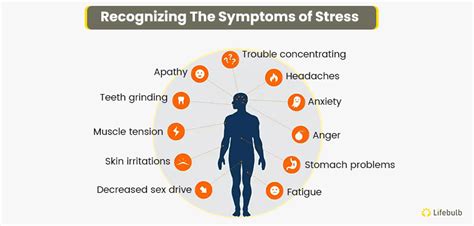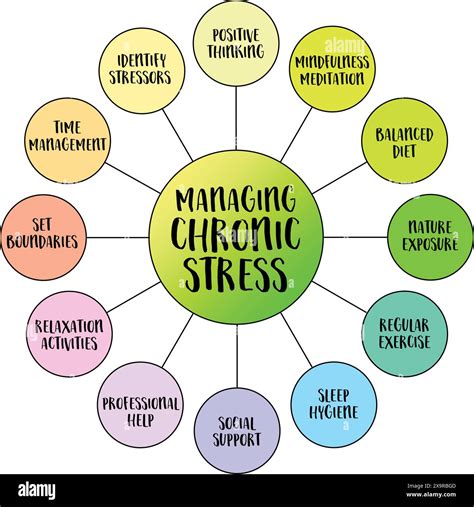Intro
Discover the 7 chronic stress symptoms, including anxiety, fatigue, and mood swings, and learn how to manage stress, reduce burnout, and improve mental health with effective coping mechanisms and self-care strategies.
Chronic stress is a pervasive and debilitating condition that affects millions of people worldwide. It can arise from various sources, including work, relationships, finances, and health concerns, and can have a profound impact on both physical and mental well-being. Chronic stress can lead to a range of symptoms, some of which may be subtle and easily overlooked, while others can be more pronounced and debilitating. Recognizing the symptoms of chronic stress is crucial, as it allows individuals to seek help and implement strategies to manage their stress levels, thereby mitigating its harmful effects.
The importance of understanding chronic stress cannot be overstated. Chronic stress can interfere with an individual's ability to function effectively in daily life, affecting their productivity, relationships, and overall quality of life. Furthermore, chronic stress has been linked to a range of serious health conditions, including anxiety, depression, cardiovascular disease, and a weakened immune system. By acknowledging the signs and symptoms of chronic stress, individuals can take proactive steps to address the underlying causes of their stress and work towards achieving a healthier, more balanced lifestyle.
Living with chronic stress can be a challenging and isolating experience. Many people struggle to cope with the constant feeling of being overwhelmed, which can lead to feelings of frustration, irritability, and hopelessness. However, it is essential to remember that chronic stress is a treatable condition, and there are many effective strategies and interventions available to help manage its symptoms. From lifestyle changes and stress management techniques to professional therapies and support groups, there are numerous resources available to help individuals navigate the complexities of chronic stress and work towards recovery.
Understanding Chronic Stress

Causes of Chronic Stress
The causes of chronic stress can be diverse and multifaceted. Some common causes include: * Work-related stress, such as long working hours, heavy workload, and lack of job security * Financial difficulties, including debt, poverty, and financial insecurity * Relationship problems, such as marital issues, family conflicts, and social isolation * Health concerns, including chronic illness, pain, and disability * Major life changes, such as divorce, bereavement, and relocationRecognizing Chronic Stress Symptoms

Physical Symptoms of Chronic Stress
Chronic stress can have a profound impact on physical health, leading to a range of symptoms and conditions. Some common physical symptoms of chronic stress include: * Headaches and migraines * Muscle tension and pain * Stomach problems, including irritable bowel syndrome and acid reflux * Cardiovascular disease, including high blood pressure and heart disease * Weakened immune system, making individuals more susceptible to illness and infectionManaging Chronic Stress

Cognitive-Behavioral Therapy for Chronic Stress
Cognitive-behavioral therapy (CBT) is a highly effective approach for managing chronic stress. CBT focuses on identifying and challenging negative thought patterns and behaviors, and replacing them with more adaptive and constructive ones. Some key principles of CBT for chronic stress include: * Identifying and challenging negative self-talk and self-criticism * Developing problem-solving skills and coping strategies * Practicing relaxation techniques, such as deep breathing and progressive muscle relaxation * Building social support networks and engaging in social activities * Setting realistic goals and taking regular breaks to manage stress and prevent burnoutConclusion and Next Steps

As you continue on your journey to manage chronic stress, remember that you are not alone. There are many resources available to help you cope with the challenges of chronic stress, from online support groups and forums to professional therapies and counseling services. By taking proactive steps to manage your stress levels, you can reduce your risk of developing anxiety, depression, and other stress-related conditions, and improve your overall physical and mental well-being.
What are the common causes of chronic stress?
+Common causes of chronic stress include work-related stress, financial difficulties, relationship problems, health concerns, and major life changes.
How can I manage chronic stress?
+Effective strategies for managing chronic stress include exercise and physical activity, mindfulness and meditation, social support, time management and prioritization, and professional therapies such as cognitive-behavioral therapy.
What are the physical symptoms of chronic stress?
+Common physical symptoms of chronic stress include headaches and migraines, muscle tension and pain, stomach problems, cardiovascular disease, and a weakened immune system.
Can cognitive-behavioral therapy help with chronic stress?
+Yes, cognitive-behavioral therapy (CBT) is a highly effective approach for managing chronic stress. CBT focuses on identifying and challenging negative thought patterns and behaviors, and replacing them with more adaptive and constructive ones.
Where can I find support for managing chronic stress?
+There are many resources available to help you manage chronic stress, including online support groups and forums, professional therapies and counseling services, and healthcare professionals such as psychologists and psychiatrists.
We hope this article has provided you with a comprehensive understanding of chronic stress and its symptoms, as well as effective strategies for managing and overcoming it. If you have any further questions or concerns, please do not hesitate to reach out to us. Remember, managing chronic stress is a journey, and it is essential to be patient, kind, and compassionate with yourself as you work towards achieving a healthier, more balanced lifestyle.
